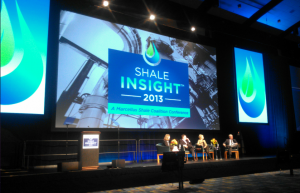Shale Insight 2013: Oil Is Changing The Conversation In Philadelphia
-
Katie Colaneri

Katie Colaneri/StateImpact Pennsylvania
A panel discussion at the Marcellus Shale Coalition’s annual industry conference in Philadelphia.
More than 1,500 people are attending the Marcellus Shale Coalition‘s annual industry conference in Philadelphia this week under a new banner: “Shale Insight 2013.”
In a shift from just three years ago when the first gathering was held, the conference has dropped “gas” from its name and opened up the conversation to the wealth of new opportunities from shale oil.
Day one of the conference began with a panel led by outgoing MSC CEO Kathryn Klaber who spoke to three other industry leaders from North Dakota, Texas and Colorado about oil and gas development in their states.
Phil Rinaldi, CEO of Philadelphia Energy Solutions, spoke on a panel about the revival of the city’s oil refineries thanks to the boom in North Dakota’s Bakken Shale.
“At first blush, it seems strange to have a refining talk at a Marcellus gas conference,” he told the audience at the Pennsylvania Convention Center.
To hear Rinaldi tell the story, the shift only becomes more obvious. When Sunoco announced the closure of its 140-year-old refinery complex in South Philadelphia, the industry was losing money and crude oil prices were high. But Rinaldi saw an opportunity and an “exceptional piece of real estate.” It’s 1,500 acres and has access to railroads, highways, pipelines and ports.
At that time, fracking in the Bakken Shale was only just beginning. Now, the formation is producing close to one million barrels of oil a day.
Next week, Philadelphia Energy Solutions will cut the ribbon on a permanent rail facility that Rinaldi says will accept 160,000 barrels a day of Bakken crude at its peak – that’s more than half the refinery’s total capacity.
And they aren’t the only ones benefitting. Sri Iyer is a Vice President with global plastics manufacturer Braskem. The company bought a part of Sunoco’s refinery in Marcus Hook, Delaware County to create its own feedstock for plastics. “Shale oil is a new phenomenon,” he says.
But where does that leave natural gas? Both Iyer and Rinaldi say the next step for both of their companies is to start leveraging the Marcellus Shale gas being produced in Pennsylvania. For Iyer, that means converting ethane, the main component of natural gas, into ethylene and polyethylene, petrochemicals that can be turned into products.
For Rinaldi, that means thinking bigger when it comes to Philadelphia’s refining capacity and how to move gas produced in the western part of the state to the east.
“We’re living in interesting times,” he said. “Philadelphia will be an energy hub.”
















